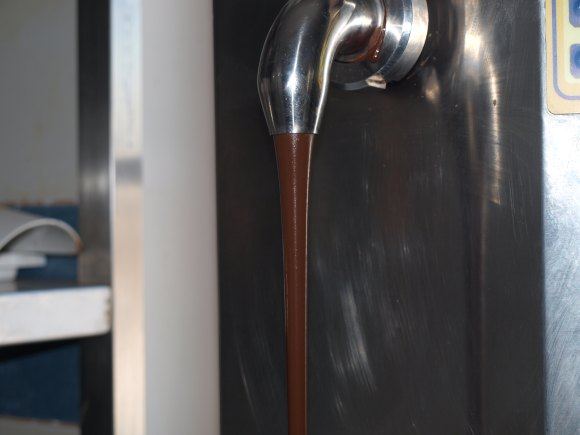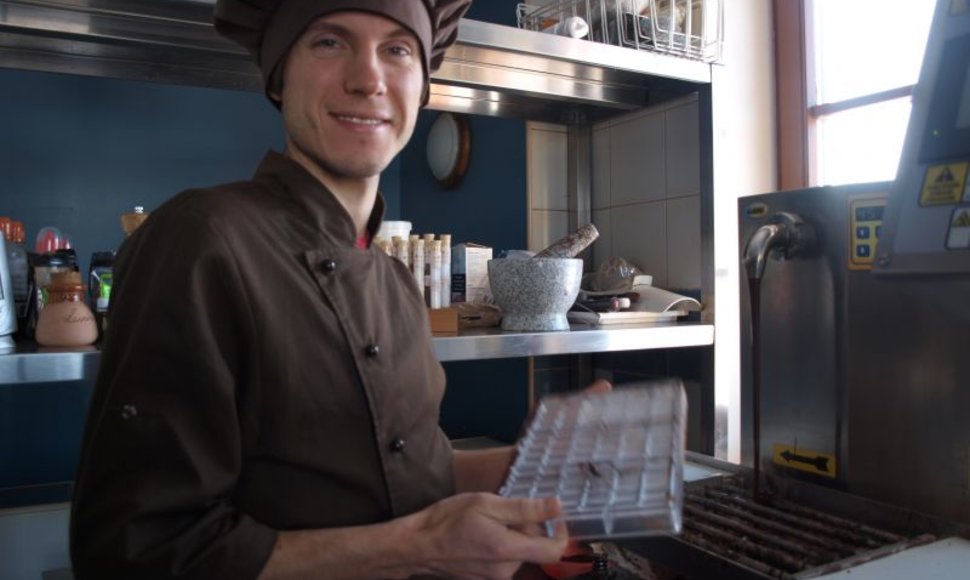Chocolate, sweetness – these are all synonyms for love. Domantas Užpalis, a 28-year-old chocolate maker from Giedraičiai (Molėtai district), is well aware of that. There is, however, enough space for only one passion in his life and he calls it “Chocolate Naïve.” Others, non chocolate-flavoured passions will have to wait.
Multi-functional man
The chocolate factory in Giedraičiai is busy dawn to dusk – with Domantas, his colleague Darius Laurinavičius, and assistant Kristinutė with her daughter Sabina bustling around. The latter two are not swooning anymore from the smell and taste of chocolate, but Užpalis savours a teaspoon of honey and follows with a bite of chocolate – he hasn't had enough yet.
Asked to introduce himself, Domantas lists his physical characteristics: blue-eyed, average height. Regaining seriousness, he says he has no particular interests or talents: chocolate is his only lifestyle. If he had to define his position in the factory, it would be: “Chocolate designer, alchemist,” he smiles, “ideological leader of “Chocolate Naïve,” producer, cleaner, accountant, PR. We're still tiny, you have to do many things yourself.”
Domantas' life falls in two distinct periods: before and after. Six years ago, he was working as a financier in an IT company in Vilnius, having changed many professions. He finally left for London to study and received a degree in urban planning. He came back to Lithuania in 2008, at the outset of the crisis. Domantas tried looking for a job, he took up work he didn't care for: “I realized that no one was going to take care of me, roast pigeons were not flying in my mouth; that I had to do something myself. I had always been involved with food (as an eater), so I started to work with organic foods from country farmers. That's how I met Darius – he was my dairy man. We started selling milk and dairies. That was our first step towards independence, even though we were working only for money.”
Domantas had no shortage of energy – or the breadth of outlook – so after considering everything A to Z, he stumbled upon chocolate. He received a grant from the EU and ordered a ton of cocoa beans. “A truck with beans pulled in. A sight of considerable impress. I didn't have a car or any idea what to do with a ton of coffee beans. But I had to deal with it. The company and the place turned up in macabre circumstances and, in spring, we moved here, to the country. We started with ice-cream, since it was the season. First machinery came in. Everything seemed very abstract, unexpected, quite unclear. Finally, last autumn, there came the chocolate.”
Bean to bar
Chocolate in this factory is made bean to bar. The beans are roasted, shelled, separated from refuse. Then they are sorted out and ground. Grinding is the longest process – it takes three days. The mass is then left to ripen in stainless steal cans. Then it is chopped and melted. The following step – tempering. It determines the form and glare of chocolate bars. Tempered chocolate is then wrapped.
The whole process takes a week. If they tried, they could do it in four days. “If you do it faster, there's some loss in quality, but only true gourmets would know the difference,” chocolate maker grins, admitting he does not consider himself a true gourmet yet.
Suddenly, Domantas jumps off the chair and improvises a tasting. First, he gives me a bite of a known Lithuanian dark chocolate brand, and them – some of his own shocolate which is five times more expensive. One can indeed feel the difference in flavour. The latter is more tender. More cacao, less sugar.
Why is it so expensive, I ask. Užpalis is frank: “It's only natural that a producer, having put so much effort, so many expensive ingredients, expects to get compensated accordingly. Our product costs twice us much to make as the price of 100-gram chocolate bars in supermarkets, not to mention their production costs. You don't need to have subtle tastes to tell the difference – it is sharp. It is not really that difficult to tell good chocolate from bad chocolate.”
Competition only from abroad
Užpalis has no competition in Lithuania so he set his eyes on international markets. On 14 Februrary, he is going to London with samples of his new products. “I feel confident now, I'm happy with the future product,” the chocolate maker assures. “Our market is not here, it's there. There, you have to work, it takes time, competition is intense. But our target is quite realistic – 20 tons of cocoa beans a year. We have been in operation for less than a year, but we've already used up our ton of beans. For a time being, we're concentrating on improving quality, not expanding. I'm not yet ready to take my hands out of chocolate.”
Domantas is evasive about how much money his chocolate brings and if it is enough to make a living: “My personal expenses are negligible: toilet paper, toothpaste. I live on farm food. All earnings go back to chocolate. I do not have personal life at the moment. No time for that. I need to focus, to save energy.”
 |
| Dalios Daškevičiūtės/15min.lt nuotr./Chocolate from a tap. |


















